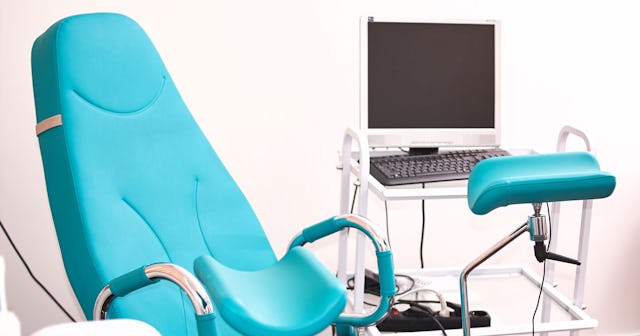I Got A Physical Therapist ... For My Vagina

Did you know there was such a thing as a pelvic floor therapist — that’s right — a physical therapist for your vagina? They can help you fix things like incontinence, improve sexual experience and provide pelvic stability after giving birth. And I want to know why the hell is this not common knowledge?
I know I can’t be the only one that was clueless about this. After having kids, I thought I was relegated to peeing on myself for the rest of my life. And I had also resigned myself to not feeling my husband during sex as much as I use to before birthing my little crotch destroyers. But after a sneezing incident where I managed to shatter my phone when I panicked and snatched my legs together, a doctor friend told me my problem can be fixed. What?! You mean I am not ruined for life?
I have been dealing with this for basically a decade. I am accustomed to stopping everything and quickly crossing my legs together every time I sneeze. I carry extra underwear in my purse and car for emergencies and use incontinence products like bladder supports and pads. But frankly, I got fed up with not being able to control a simple bodily function.
I finally got fed up enough to get over my fears and visit a urologist. I wanted to find out what the heck was going on with my lady parts. And yes, I saw a urologist first because you typically need a diagnosis and a referral for a pelvic floor therapist.
I was diagnosed with a weakened bladder neck, the area that connects the bladder to the urethra. Or rather, as the urologist said in layman’s terms, a “wonky” bladder neck and also some possible nerve damage. Thanks kids … thanks a lot.
After explaining the possibility of surgery to rectify my “wonky” bladder neck, he referred me to a pelvic health therapist. And although I was excited to finally take some steps closer to no longer peeing on myself, I was apprehensive about what exactly a pelvic health therapist does and what I will have to do during the appointments.
Dr. Heather Jeffcoat, DPT, Pelvic Health Physical Therapist, and Poise® partner, shared with me that pelvic health therapists restore function, reduce pain and improve coordination and strength of the pelvic floor. And pelvic floor therapy isn’t just for mommas that are tired of peeing on themselves or women that experience pain during sex. It can help everybody – because all humans, of all genders and ages, have pelvic floor muscles. And it can even help with things like chronic lower back pain, constipation, and abdominal pain. Who knew?
If you are anything like me, you are probably thinking … just do Kegels. But Dr. Jeffcoat explains that every person needs to be assessed to determine the specific causes of one’s conditions. And, Kegels may not be the proper way to address your particular condition. Depending on your needs, treatment can include pelvic floor biofeedback, muscle coordination training, breathing techniques, behavioral retraining, progressive loading exercises, and pelvic floor relaxation techniques.
So, what was my experience? Well, I am three weeks and two visits into physical therapy for my vagina. And I’m not going to lie — it’s an odd experience. It’s kind of like having weekly visits with your OB-GYN, but your OB-GYN is actually a “hands on” trainer. Catch my drift?
And although my pelvic floor therapist is professional and does her best to put me at ease, it takes some getting used to. However, at this point, I am willing to do whatever it takes to get back as much function of my lady parts as possible. And it turns out that Kegel exercises actually are one of the treatments for me.
If you find this information a bit overwhelming or nerve-wracking, you are not alone. Dr. Jeffcoat admits that pelvic floor therapy is an underutilized subspecialty in healthcare, and that there is a gap in access to pelvic floor physical therapy providers.
She believes women deserve answers and treatments for their health questions, especially taboo subjects like sex and bladder health. And she even published a book about it, “Sex Without Pain: A Self-Treatment Guide To The Sex Life You Deserve,” to make her therapy techniques readily available to all.
What I have learned so far is that the vulva, vagina, and anything down in your “nether” regions are anatomical structures, just like your shoulder or knee. And if you are experiencing pain, discomfort, or lack of function, you should have them examined and treated.
At the end of the day, a little discomfort, physical or otherwise, once a week to address a chronic problem that affects my daily life is worth the trade-off. So my advice is to find a pelvic health therapist near you and start your own journey to a healthier, drier and maybe even more sexually satisfied you.